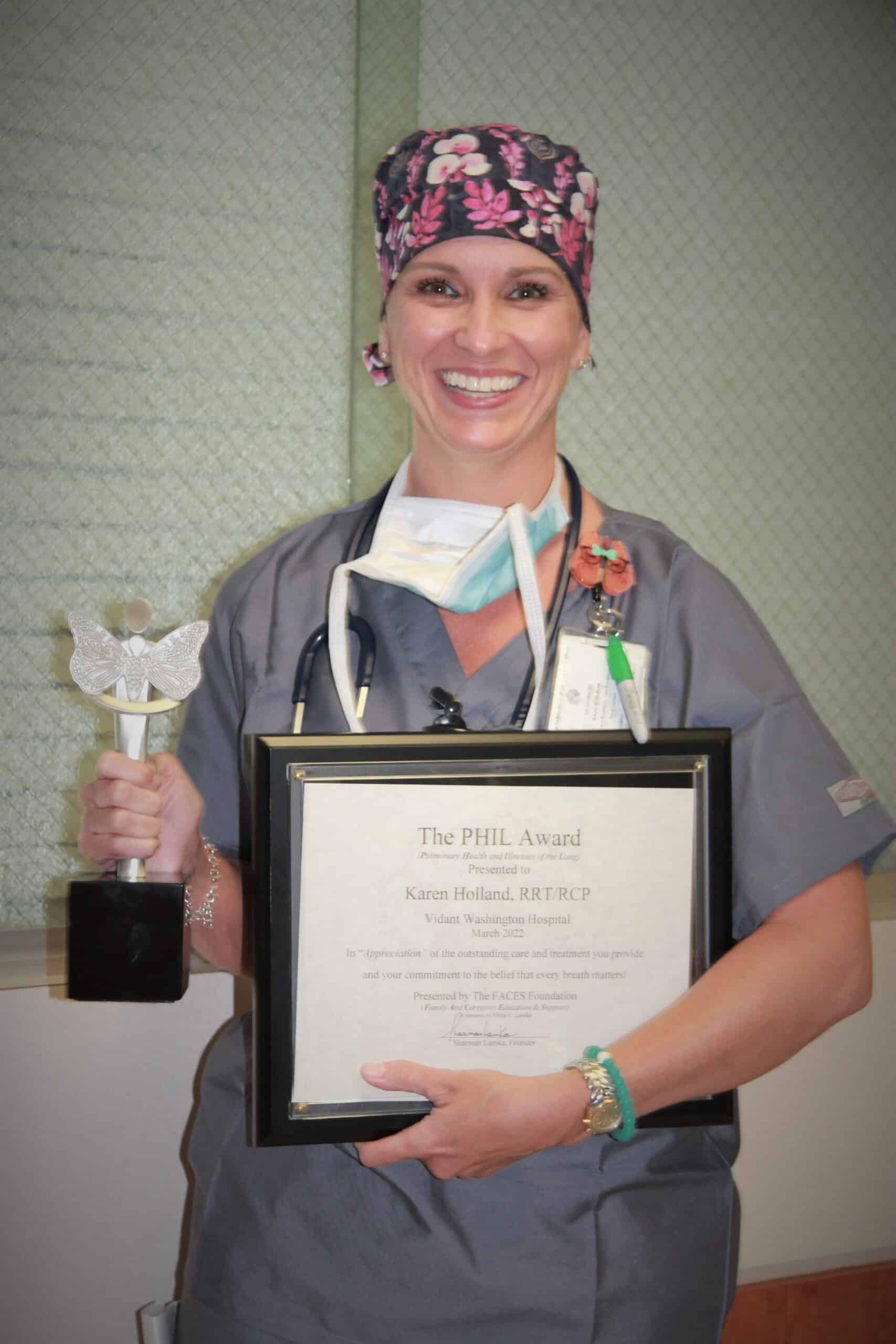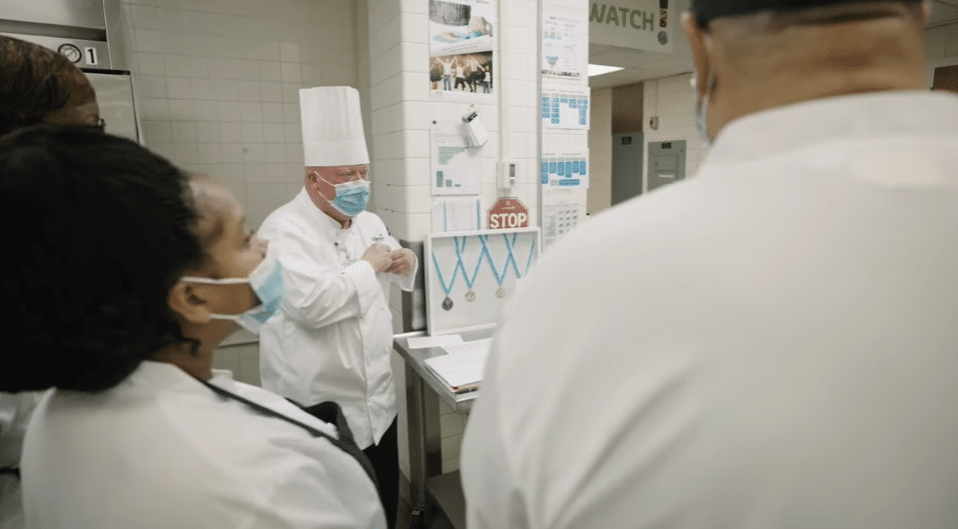WASHINGTON, NC – Compassionate, a strong patient advocate, calm and comforting are just a few ways respiratory care practitioner Karen Holland is described by patients and their families as well as the doctors she works alongside. Karen was recently awarded the Pulmonary Health and Illness of the Lung (PHIL) Award for excellence in respiratory care; nominated by two physicians who care for patients at ECU Health Beaufort Hospital.
Karen often works with the most critical patients and over the past two years many of those patients had COVID-19. The physicians who nominated her commented on the many incidents of witnessing Karen sitting at a patient’s beside as their condition was deteriorating, educating and explaining to patients what was happening. Karen’s demeanor is calm and comforting and patients often call on Karen to talk with their families, even after the physicians had talked with them to help explain and calm fears. She is a strong advocate for her patients and provides special attention to make sure patients and their families stay in communication throughout their hospital stay.
Karen was presented with the PHIL award by Alene Payne, manager of respiratory care at ECU Health Beaufort Hospital. The PHIL Award was established by the FACES Foundation to recognize outstanding respiratory practitioners who provide care and treatment for patients with respiratory illness. ECU Health recognizes two PHIL Award winners each year – one from ECU Health Medical Center and one representing the ECU Health regional hospitals. Karen was named as the regional recipient. This is the fifth consecutive year the regional award has been received by an ECU Health Beaufort Hospital team member.

Karen is a graduate of the Pitt Community College respiratory therapy program and began her career as a respiratory care practitioner in 1995 at ECU Health Medical Center (then Pitt County Memorial Hospital) and joined the Beaufort team in 2012. She is an amazing respiratory care practitioner and also a strong proponent of every discipline involved in caring for a respiratory patient. She recognizes the benefits of the entire care team and is a positive support for all of her colleagues.
Payne presented the award to Holland surrounded by her colleagues and hospital leadership. One of the physicians commented, “Karen is not only an excellent therapist, but you know she care about her patients; this is more than just a job for her and it shows in all that she does.”
ECU Health Beaufort Hospital – a Campus of ECU Health Medical Center – is featured in a new documentary from the BBC. Produced by BBC StoryWorks Commercial Productions for The World Wide Fund for Nature (WWF), this documentary follows the Sodexo/ECU Health partnership, which shares a common goal to improve the health and well-being of the people and communities we serve.
Nearly one-third of food produced around the world ends up as food waste. Sodexo implements its WasteWatch program across all ECU Health hospitals to reduce food waste, drive cost efficiency and positively impact the environment. WasteWatch is Sodexo’s key initiative to achieve its objective of reducing 50 percent of food waste within its operations, covering 85 percent of its raw material costs. ECU Health Beaufort Hospital hosts one of the most efficient, highly successful Sodexo WasteWatch programs, producing very low amounts of food waste, which saves money and drives positive impacts on the environment.
The Beaufort team has been using the WasteWatch powered LeanPath program since August 2020, and they use the data and insights to put in place specific actions that have positive impacts for the environment. Team members tailor portions cooked each day based on data collected to reduce excess food, which helps preserve resources and reduce food waste.
“Taking care of our community and environment by doing our part to help reduce waste are values that our partnership with Sodexo helps us meet,” said Lou Montana-Rhodes, vice president of experience at ECU Health. “We are proud to recognize our food and nutrition team members at ECU Health Beaufort Hospital and all across eastern North Carolina for their commitment to leading the way in reducing food waste and bringing quality care to those we serve.”
ECU Health is proud to collaborate with Sodexo to bring high quality food and compassionate care to our patients.
Washington, N.C. – ECU Health Beaufort Hospital – a campus of ECU Health Medical Center has been designated as a primary stroke center by The Joint Commission and the American Heart/Stroke Association, recognizing the hospital’s preparedness and expertise to care for stroke patients. Stroke is one of the leading causes of death in the state, resulting in more serious long-term disabilities than any other disease. With this designation, all ECU Health hospitals are equipped to provide advanced stroke care in communities across eastern North Carolina.
“Stroke certification from The Joint Commission represents ECU Health Beaufort’s commitment to provide high-quality stroke care to not only patients experiencing stroke symptoms, but to all of our patients,” said Debra Hernandez, president of ECU Health Beaufort. “We are proud of being designated a primary stroke center. The commitment and diligent work of team members across all levels and services made this a reality.”

As a primary stroke center, ECU Health Beaufort can treat and stabilize patients experiencing an acute stroke and care for more complex patients. As part of stroke readiness by all hospitals in the ECU health system, this certification is symbolic of a comprehensive stroke network capable of meeting the needs of all patients across eastern North Carolina.
“Achieving stroke certification for all nine hospitals has been our goal since launching an intentional focus on improving stroke care in eastern North Carolina seven years ago,” said Barry Bunn, chief of medical staff and regional medical director of emergency services, ECU Health. “At the start of this process, ECU Health began a pathway of certifying all of the ECU Health hospitals with some level of stroke certification by the Joint Commission. Stroke certified hospitals were prevalent west of I-95, but there were few certified hospitals in the eastern part of the state. Now, we can proudly say that patients across the region will have access to high-quality stroke care, regardless of where they live.”
Because time is one of the most important factors in treating stroke, it is vitally important to provide stroke care close to home. ECU Health Beaufort’s stroke certification increases proximity to quality care in the Washington area, which reduces the risk of mortality, permanent brain damage and other side effects including memory loss, difficulty speaking and potential paralysis.
During the certification process, ECU Health Beaufort was evaluated on performance measures in stroke care, including education for patients and families on stroke risk factors and recognizing symptoms of stroke. Other performance measures included staff education on stroke protocols and the appropriate prescription of medications to address stroke risk factors such as elevated cholesterol and blood pressure.
The severity and likelihood of having a stroke in North Carolina is significantly higher than the rest of the country as a whole. Eastern North Carolina is at the center of many strokes, often called the buckle of the stroke belt. North Carolina is about 8 percent worse for stroke mortality than the national average, and in eastern North Carolina, that risk is even greater.
“With all hospitals in the ECU Health system now stroke certified, a patient will be offered life-saving care regardless of the patient’s proximity to any of ECU Health’s hospitals and depending upon what additional treatments are needed, can be transported to a location with more extensive services when the patient is stabilized,” said Jay Briley, president of ECU Health Community Hospitals. “This system-wide stroke certification helps fulfill ECU Health’s mission of improving the health and well-being of eastern North Carolina.”
Vidant Beaufort Hospital, a Campus of ECU Health Medical Center and ECU Health Women’s Care, located in Washington, offered free breast cancer screenings on Friday, Feb. 25 for uninsured women 40 years of age and older with at least one year since their last mammogram.
“Some of these patients have never had mammograms before, and some of them haven’t had one in many years,” said Caddie Cowin, DNP, FNP-C at ECU Health Women’s Care – Washington. “All of these patients are either uninsured, or their insurance does not cover breast cancer screenings.”

Patients received a clinical breast exam, mammogram and education on signs and symptoms of breast cancer to watch for. Mammograms are one of the greatest tools to screen for breast cancer, and early detection is proven to save lives. Even with monthly physical exams at home, mammograms can catch warning signs that go undetected. Yearly mammograms are recommended to begin at age 40, or age 35 if you have close family history of breast cancer. Breast cancer can be treated with better outcomes if caught early.
According to the Department of Minority Health, Black women were just as likely to be diagnosed with breast cancer, however, they were almost 40 percent more likely to die from breast cancer, as compared to non-Hispanic white women from 2014-18. An explanation for that gap, according to the 2020 census, could be health insurance. The percentage of the Black population with no health insurance coverage for the entire calendar year was higher than for non-Hispanic Whites, at 9.6% compared to 5.2%, according to the 2020 census. Bridging the health care gap to provide early clinical interventions is important in eastern North Carolina, where Vidant and the future Vidant Health serves a large, diverse region.
“The biggest challenge is access to care,” said Cowin. “We know that patients with a lower socioeconomic status struggle more with access to health care and insurance. The disparity is challenging, but this program can help address the need. Just because they cannot pay out of pocket doesn’t mean they can’t get as good care as anyone else.”
“The last clinic we did, a couple of patients ended up needing biopsies, so we were able to catch potentially dangerous things early,” said Cowin. “We could save somebody’s life with what we are doing.”
If a patient does have abnormal findings, the Breast and Cervical Cancer Control Program (BCCCP) from the county health department funds follow-up appointments and connects women to treatment if diagnosed. BCCCP is designed to help uninsured or under-insured women pay for mammograms and pap smears, according to Sherri Griffin, RN, BCCCP nurse navigator, Beaufort County Health Department.
“If we do have any ladies unfortunately diagnosed with breast cancer, we help them apply for breast and cervical cancer Medicaid, which pays for their treatment,” said Griffin. “The women that we have treated today are in a gap where most cannot qualify for Medicaid but cannot afford health insurance. They typically put off health screenings because they have to pay out of pocket. At this event, we fill in gaps for the women who may need additional imaging after the initial screenings.”
Screenings at this event were funded by the Shepard Cancer Foundation and Vidant Health. For more information on cancer screenings, please visit VidantHealth.com/Cancer. More information about BCCCP can be found at BCHD.net.
Read more in The Washington Daily News.

